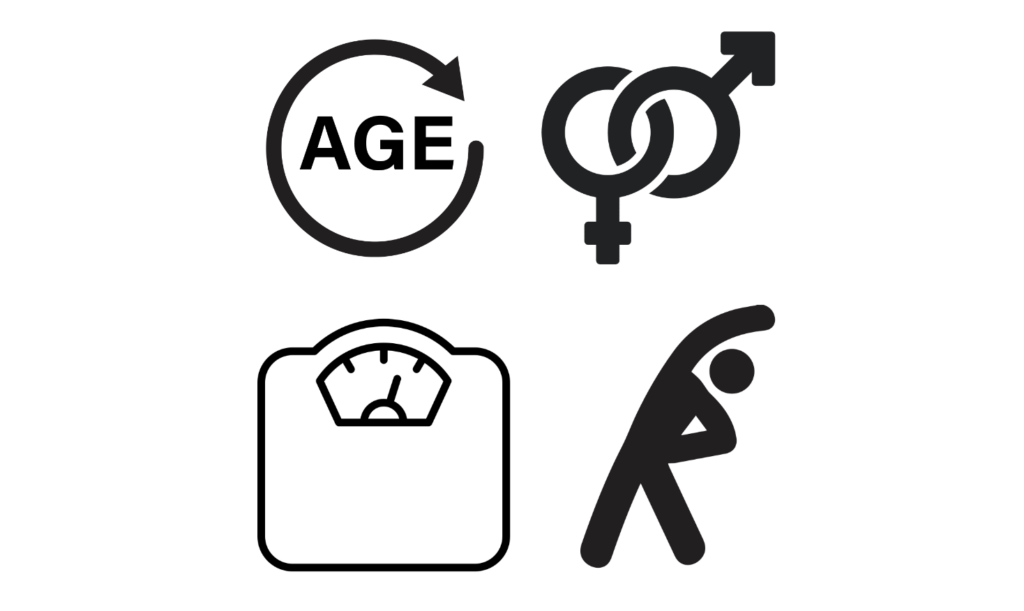Diet & Nutrition, Health
What are the Factors Influencing Calorie Intake
Understanding your daily calorie needs is critical to maintaining a healthy weight and general well-being.
Calories are the units of energy that our bodies use to accomplish daily tasks, maintain important body functions, and promote physical and mental health. Our bodies cannot function efficiently if we do not consume enough calories, which can result in weariness, reduced immunity, and diminished cognitive function. Excess calorie intake, on the other hand, can lead to weight gain, obesity, and other health issues like diabetes, heart disease, and certain malignancies.
Calorie requirements are not a one-size-fits-all measure; they differ greatly from person to person depending on a variety of circumstances. Gender, age, weight, exercise level, and basal metabolic rate (BMR) are among the characteristics considered. Each of these factors is important in deciding how many calories someone should take each day to maintain their present weight, lose weight, or gain weight. In addition, genetic predispositions, health conditions, stress levels, sleep quality, and lifestyle choices all influence daily calorie requirements.
This article digs into the key factors that influence your daily calorie intake, offering a detailed guide to help you better understand your body’s requirements. Examining how each factor affects calorie requirements will provide you insights into how to modify your diet and lifestyle for optimal health. Understanding these elements will allow you to make informed decisions regarding your diet and overall well-being, whether you want to maintain your present weight, lose weight, or gain muscle.

Gender
One of the most important factors influencing calorie intake is gender. In general, men and individuals assigned male at birth (AMAB) require more calories than women and those assigned female at birth (AFAB). This disparity is related to variations in body composition and metabolic rates.
- Body Composition: Men tend to have more muscle mass than women. Muscle tissue consumes more calories at rest than fat tissue, resulting in increased calorie requirements for men.
- Hormonal Differences: Hormones such as testosterone and estrogen affect body composition and metabolic rate. Testosterone promotes muscle growth, which raises calorie requirements.
- Metabolic rate: Men often have a higher basal metabolic rate (BMR) than women, which adds to higher daily calorie requirements.
Practical Implications
Understanding gender variations might help you customize diet and exercise routines more efficiently. Women, for example, may prioritize muscle-building activities in order to increase their muscle mass and hence their calorie requirements.

Age
Age has a substantial impact on calorie requirements. As we age, our metabolic rate fluctuates, affecting our calorie requirements.
- Children and Adolescents: They have faster metabolic rates due to growth and development. They require extra calories to accommodate their rapid bodily changes.
- Adults: Adults’ calorie needs remain stable, however they are modified by factors such as exercise level and body composition.
- Older Adults: They often have a slower metabolic rate, which reduces calorie requirements. Muscle mass declines and body fat increases, contributing to the drop in metabolic rate.
Practical Implications
Age-appropriate diets and exercise routines can help you regulate your calorie consumption more successfully. For example, elderly persons may benefit from strength training to prevent muscle loss and enhance metabolism.

Weight
Your weight is an important factor in deciding your calorie consumption. To maintain, lose, or gain weight, you must carefully regulate your calorie intake.
Weight Maintenance: To stay at your current weight, your calorie intake should equal your total daily energy expenditure (TDEE), which comprises your BMR and calories burned via physical activity.
Weight Loss: A calorie deficit is required for weight loss. Reducing daily calorie consumption by 500 calories can result in a one-pound weight loss per week.
Weight Gain: To acquire weight, consume more calories than you expend. Increasing your daily calorie consumption by 500 calories can result in a weekly weight gain of approximately one pound.
Practical Implications
Understanding your weight objectives allows you to alter your calorie consumption properly. To lose weight, eat nutrient-dense, low-calorie foods and increase physical exercise. Incorporate more calorie-dense, nutrient-rich meals into your diet to gain weight.

Activity Level
Your level of physical activity directly affects your calorie needs. The more active you are, the more calories you require to fuel your body.
- Sedentary Lifestyle: Minimal physical activity results in lower calorie needs. Sedentary individuals might have jobs that require sitting for most of the day and little recreational exercise.
- Moderately Active Lifestyle: Engaging in light physical activity or exercise a few times a week increases calorie requirements.
- Active Lifestyle: Regular, intense physical activity, such as daily exercise or physically demanding work, significantly boosts calorie needs.
Practical Implications
Adjusting your calorie intake based on your activity level can help maintain your energy balance. Active individuals might require more frequent meals and snacks rich in carbohydrates and proteins to sustain their energy levels.

Basal Metabolic Rate (BMR)
Your basal metabolic rate (BMR) is the number of calories your body needs to function at rest. It accounts for approximately 60–70% of your total daily energy expenditure. Factors influencing BMR include age, gender, weight, and body composition.
- Calculation: BMR can be estimated using formulas such as the Harris-Benedict equation, which takes into account your age, gender, weight, and height.
- Influence: Higher BMR means higher calorie needs. Factors like increased muscle mass and younger age contribute to a higher BMR.
Practical Implications
Calculating your BMR provides a baseline for determining your calorie needs. From this baseline, you can adjust your intake based on your activity level and weight goals.

Other Factors
Beyond the primary factors of gender, age, weight, activity level, and BMR, several other factors can influence your calorie intake:
Genetics
Genetics can play a role in your metabolic rate and how your body processes and stores fat. Some people naturally have a faster metabolism, allowing them to burn calories more efficiently.
Health Conditions
Certain health conditions and medications can affect your calorie needs. For example:
- Thyroid Disorders: Hypothyroidism can slow metabolism, reducing calorie needs, while hyperthyroidism can increase metabolism, raising calorie requirements.
- Diabetes: Managing blood sugar levels can influence dietary choices and calorie intake.
Stress and Sleep
- Stress: Chronic stress can lead to changes in eating habits and metabolic rate. Some people may eat more (stress eating), while others might eat less.
- Sleep: Poor sleep quality can disrupt hormones that regulate hunger and appetite, potentially leading to increased calorie intake.
Environmental Factors
- Climate: Living in colder climates can increase calorie needs as the body uses more energy to maintain its core temperature.
- Availability of Food: Access to high-calorie, low-nutrient foods can influence eating habits and calorie intake.
Lifestyle and Habits
- Eating Patterns: Skipping meals or irregular eating patterns can affect metabolism and calorie needs.
- Alcohol Consumption: Alcohol provides empty calories and can increase overall calorie intake without providing essential nutrients.
Conclusion
Understanding the numerous factors that influence calorie intake is critical for controlling your diet and leading a healthy lifestyle. By taking into account your gender, age, weight, exercise level, and BMR, you may adjust your calorie intake to your body’s requirements. Furthermore, understanding the impact of genetics, health issues, stress, sleep, environmental factors, and lifestyle choices can help you fine-tune your dietary strategy.

Summary of Key Points:
Gender: Men typically consume more calories than women due to differences in muscle mass and metabolic rates.
Age: Calorie requirements vary with age, typically decreasing as you become older.
Weight: Your weight goals (maintenance, loss, and increase) have a direct impact on your calorie consumption.
Activity Level: More active people need more calories to maintain their energy levels.
Basal Metabolic Rate (BMR): Your BMR serves as a basis for calculating your daily calorie requirements.
Additional Factors: Other factors that influence calorie intake include genetics, health conditions, stress, sleep, environment, food availability, eating behaviors, and alcohol usage.

Tips for Managing Caloric Intake
Monitor Your Diet: Keep a food journal to track your calorie intake and pinpoint areas for improvement.
Stay Active: Incorporate regular physical activity into your daily routine to boost your calorie intake and general wellness.
Get Enough Sleep: Aim for 7-9 hours of quality sleep per night to improve metabolic health and hunger control.
Manage Stress: Engage in stress-reduction activities such as meditation, yoga, or deep breathing exercises.
Seek Professional Advice: Work with a healthcare physician or qualified dietitian to develop a personalized nutrition plan tailored to your specific needs.
Understanding and regulating the factors that influence your calorie consumption allows you to gain more control over your diet and general health. Individual needs vary, so listen to your body and make modifications as needed.
Disclaimer: Please note that Discoverybody has taken great care to ensure that all information provided is comprehensive and up to date. However, you should not use this article as a substitute for the expertise that a licensed healthcare professional can offer. It’s always a good idea to talk to your doctor before taking any medication.
Sources Expanded:
- Kirby, J. (2016, March 26). What Factors Affect Your Calorie Needs dummies. Dummies. https://www.dummies.com/article/body-mind-spirit/physical-health-well-being/diet-nutrition/general-diet-nutrition/what-factors-affect-your-calorie-needs-201861/
- Brazier, Y. (2017, December 13). How many calories do you need? https://www.medicalnewstoday.com/articles/263028
- Osilla, E. V., Safadi, A. O., & Sharma, S. (2022, September 12). Calories. StatPearls – NCBI Bookshelf. https://ncbi.nlm.nih.gov/books/NBK499909/
- O’Neal, A., & O’Neal, A. (2012, May 16). 3 Factors that Influence Your Calorie Needs. Cafe Physique | Atlanta Personal Trainer | Atlanta Yoga Instructors | Atlanta Pilates. https://cafephysique.com/3-factors-that-influence-your-calorie-needs/
- Factors Affecting Energy Intake. (n.d.). Pressbooks. https://pressbooks-dev.oer.hawaii.edu/humannutrition/chapter/factors-affecting-energy-intake/
- Forzani, E. (2023, December 3). Top Factors That Impact Your Calorie Requirements – Breezing. Breezing. https://breezing.com/2022/01/19/top-factors-that-impact-your-calorie-requirements/
Trusted Health, Wellness, and Medical advice for your well-being



